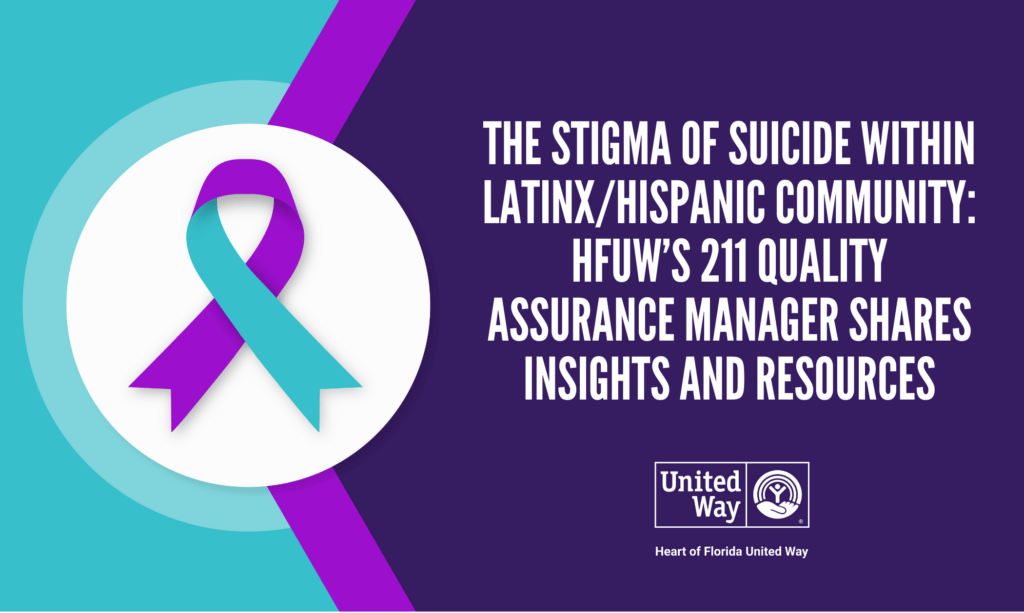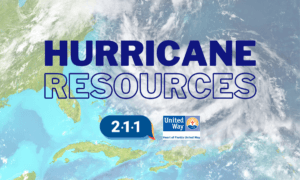By Israel Navarro, 211 Quality Assurance Manager
The stigma of suicide can prevent people from seeking the help they desperately need, so as we find ourselves at the intersection of National Suicide Prevention Month and Hispanic Heritage Month, I want to shed light on a topic that often remains shrouded in silence within the Latinx/Hispanic community.
In bringing awareness to suicide, we can help community members recognize the warning signs and encourage those in need to seek help through essential and often life-saving resources like HFUW’s 988 Suicide & Crisis Lifeline and the 211 Information and Referral Crisis Line.
Suicide has long been a misunderstood and contentious topic within the Latinx/Hispanic community, which often takes on additional layers due to our lived experiences. When looking to the past, previous generations needed to keep traditional, alternative health practices due to limited access to medical care and came together in social movements to fight against social injustice.
These experiences give Latinx people the strength to face the oppression of today.
Although these qualities are often synonymously represented throughout our rich and diverse culture, an emphasis on resilience and family support has sometimes made it challenging for us to speak openly about our mental health struggles.
Stressors Our Hispanic Community Members Experience
There are also many unique stressors impacting us, most of which I have felt personally throughout my life. Some of those unique stressors include racism, lack of access to necessities, threat of deportation, separation of families, low paying jobs, and violence experienced in our home countries.
There are also environmental factors which can amplify or prolong these stressors because at any given moment we can experience discrimination, concerns with immigration status and family separation, becoming a caregiver, financial or employment worries, challenges adapting to a different culture, and the use of linguistic and cultural mediators known as the “translator child.”
Additionally, Adverse Childhood Experiences (ACEs) can be felt through many of our upbringings, which are a result of frequent, extremely stressful, or prolonged body stress responses. Some examples of ACEs include:
- Experiencing violence, abuse, or neglect
- Witnessing violence in the home or community
- Having a family member die by suicide
Signs of Suicide
Although ACEs impact people of different races and ethnicities in different ways, many Latinx community members may endure ACEs throughout their childhood resulting in an additional barrier to seeking mental health care. So, the closer we look at mental health, suicide, and its impact on our community, the more we understand the difficulty many of us face sharing our story with others. That being said, it is crucial to recognize the warning signs and initiate inclusive conversations around suicide.
These signs can manifest in various ways, such as noticing someone exhibiting:
- Drastic changes in behavior
- Sudden shifts in mood
- Isolating from social interactions
When someone begins withdrawing from friends and family, isolating themselves, or losing interest in activities they once enjoyed, it may be a sign of emotional distress. If these are signs you have noticed, we want to begin paying closer attention to any statements or social media posts that suggest a lack of hope or a desire to escape. If there is any history or routine use of alcohol or drugs, a sudden increase can be a coping mechanism if they’re struggling with emotional pain. If someone begins contemplating suicide, they also may start giving away their belongings as well as their way of tying up loose ends.
Consider These Cultural Nuances
When discussing suicide in Latinx/Hispanic communities, it is essential to be sensitive to cultural nuances and take a culturally inclusive approach. Here are some aspects of inclusion to consider:
- Spirituality and Religion: Many Latinx/Hispanic individuals have strong ties to their religious or spiritual beliefs. Understand that these beliefs can influence how individuals perceive and cope with mental health challenges, including suicidal thoughts. Be respectful of their beliefs and use them as a resource for support when appropriate.
- Immigration: Recognize the potential stressors related to immigration status and acculturation. Undocumented individuals may face unique challenges and fears that contribute to their distress. Ensure they are aware of resources available regardless of their immigration status. Consider how acculturation levels may impact an individual’s mental health. Striking a balance between maintaining cultural identity and adapting to a new culture can be challenging.
- Community Resources: Connect individuals with culturally relevant mental health resources and support groups within their community. These resources may provide a sense of belonging and understanding that can be particularly beneficial.
Resources Available to Our Hispanic Community
Thankfully, there are resources available for those facing mental health crises, including 988 and 211. Remember, seeking help is a sign of strength, and together, we can support one another and ensure that no one feels alone in their struggle with mental health issues.
By sharing this message, we take a step towards a brighter future for the Latinx/Hispanic community and a world where suicide prevention is a priority for all.
If you or someone you know is struggling with thoughts of suicide, please reach out to the 988 Suicide & Crisis Lifeline. Help is available, and there is hope.
Personally, I am beyond grateful for the opportunity to share some insights and perspectives around my work at HFUW and I hope this post promotes our efforts of empowering community members to Live United.









